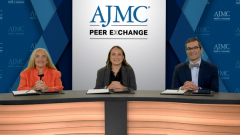
Medication Access Programs for Patients
An overview of the importance of specialty pharmacies, coupons, and product samples.
Episodes in this series

Casey Butrus, PharmD: [Dr Baldwin], I want to get your thoughts on the cost perspective. I know a lot of these branded products, even if they are approved after prior authorization, there can be a really high co-pay. How do you use medication access programs or co-pay cards for your patients, and how do you help patients overcome these cost issues for these therapies with high co-pays?
Hilary Baldwin, MD: I’ve completely given up on regular pharmacies, and I’ve gone over exclusively to specialty pharmacies. One of the advantages of getting older or getting old, actually, is that you can make certain requests of patients, and when they say, “Can’t I use my local pharmacy?” “No, this is how you’re going to do it. They have all the coupons, they’re the most likely to get you the product that I want you to get and get it for the lowest possible cost to you. So this is the way we’re going to go.” And I don’t give them a choice anymore. But I also expect, once I’ve explained and I do a lot of explaining, this is why I want this drug and not that drug, I expect them [to take it], assuming of course that they can actually afford it. I’m not talking about somebody who buys the medicine and then can’t pay rent. But a lot of our patients have plenty of money to afford these medications and choose not to; that’s their business. But if that’s the kind of patient I’m dealing with, I explain to them that if you’re going to get a Rolls-Royce, you’re going to pay more for it than you do for a Ford Fiesta. And I’m hoping that you are going to accept that cost and help pay for this better medication. And then of course, [there are] samples. I tend to save up all my samples and then hand a whole box to a particularly needy patient who can’t otherwise afford the medication. So I offer to supplement them and perhaps every other month I can give them a couple of weeks’ worth of medication from my sample closet.
Casey Butrus, PharmD: [Dr Mostaghimi], do you do anything differently with medication access for patients?
Arash Mostaghimi, MD, MPH, FAAD: I find medication access to be a big challenge, so at an academic practice, we don’t have samples. In Massachusetts, where I’m from, there are some restrictions around the couponing and things along those lines. But I think the main thing to do is be transparent and try to really work with the patient so they understand that if they go and can’t get the medication, first they may need to expect a delay. We’ll work with them, we’ll work through it, and they can’t give up. So ironically, one thing that we haven’t talked about is the cost for everybody. One real issue is it’s inequitable in terms of how this is distributed across the population. Sadly in the United States, lower social economic status correlates with people of color, people from Hispanic and African American communities where I live in Boston. And these are folks who already have a lot of challenges for a number of reasons; making it to the doctor, paying for those appointments, or getting there. So even for them, trying out something for 2 weeks that fails and coming back a second or third time is particularly onerous. They may not be salaried, they may not have transportation, they may not be able to take time off from work, or they may not have childcare. So what I really try to do is establish a connection with them and then try to be as transparent about the process as much as possible. Fortunately, my institution has some support from pharmacists to help navigate the prior authorization process and work with them, and also provides support in multiple languages, which can really be helpful. But that’s an added burden of expense that’s brought by our institution that an individual in the community won’t be able to do in the same way. We basically try to create that sense of partnership from the get-go and say, “Look, we’re going to try really hard and we’re going to get you somewhere. We can’t guarantee where that’s going to be, but we’re not going to give up, we’re going to keep on going.”
Casey Butrus, PharmD: I think this disease state in dermatology is specifically unique, and I’m sure you’re familiar with atopic dermatitis and psoriasis, where you usually have a biologics coordinator or somebody familiar with using specialty pharmacy. So I think acne is a little bit different in that maybe there isn’t as high touch to these patient populations, but hopefully with more education and getting the word out there, there could be more advocacy for prior authorization support for these patients as well.
Transcript edited for clarity.
Newsletter
Stay ahead of policy, cost, and value—subscribe to AJMC for expert insights at the intersection of clinical care and health economics.











